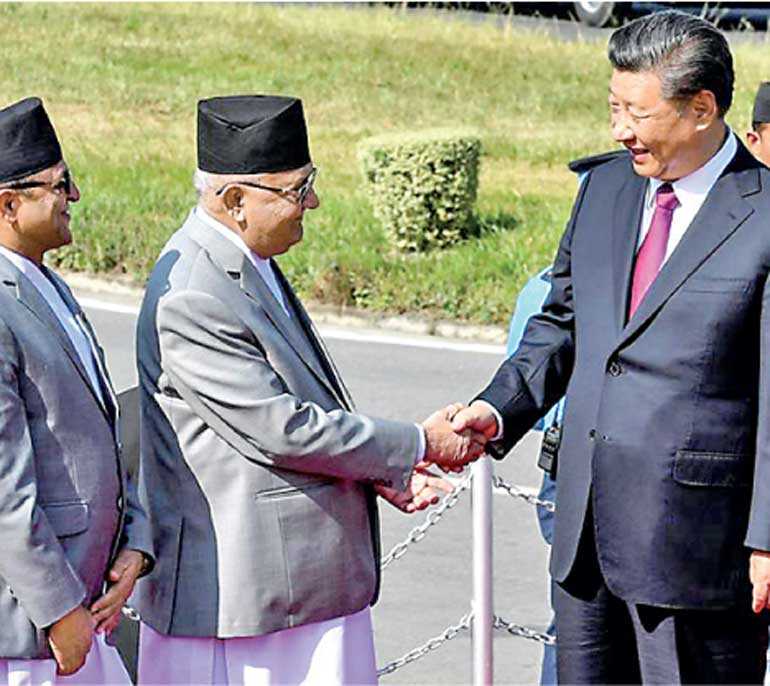Sunday Feb 22, 2026
Sunday Feb 22, 2026
Saturday, 2 January 2021 00:02 - - {{hitsCtrl.values.hits}}

China's President Xi Jinping shakes hands with Nepal's Prime Minister KP Sharma Oli as he wraps up his two-day visit to Nepal, in Kathmandu via Reuters
KATHMANDU (Reuters): Alarmed that a political crisis in Nepal could endanger China’s strategic interests and Belt and Road projects, a Chinese Communist Party emissary has held days of talks to try to stop the Himalayan country’s ruling communist party from tearing itself apart.
The crisis erupted on 20 December when Prime Minister K.P. Sharma Oli, decided he could no longer work with rival factions within his Nepal Communist Party (NCP), which was formed in 2018 to unite the Marxist-Leninist and main Maoist parties following their success in elections in late 2017.
With two years of his term to run, Oli dissolved parliament and called for fresh elections in a move that foreign diplomats say caught China by surprise and plunged the impoverished nation of 30 million people into uncertainty.
Seven ministers quit Oli’s government, and anger over the descent into political infighting at a time when the economy is reeling from the coronavirus sparked protests at which effigies of the prime minister were burnt.
Within days, Beijing dispatched to Kathmandu Guo Yezhou, a vice-minister in the Chinese Communist Party (CCP) International Liaison Department, which manages relationships with foreign political parties of all hues, both in power and opposition.
“It is evident that China is angered by Oli’s abrupt move amid a pandemic ... they are clearly concerned about the massive investments they have pledged,” said a senior European diplomat.
“They are shocked as to how Oli could make a bold political move without prior consultations,” said the diplomat, requesting anonymity as he is not authorised to speak to the media.
Oli has recommended an election be held in two phases in April and May, but what happens next could be in the lap of the Supreme Court, as his opponents have challenged the dissolution of parliament as unconstitutional. A hearing will resume in January.
Speaking to all sides
Guo has held separate meetings with Oli, and rivals in the communist party to get their sides of the story, as well as leaders of the main opposition party and other politicians.
Commenting on the delegation’s visit to Kathmandu, China’s foreign ministry spokesman Zhao Lijian said China hoped “all the various parties in Nepal can put national interest and the overall situation first, and proceed from there, while properly handling internal differences and working towards political stability and the country’s development.”
Madhav Kumar Nepal, a former prime minister and one of the main critics of Oli within the Nepal Communist Party (NCP), was high on Guo’s dance card, and Ram Karki, the NCP’s deputy chief of the foreign affairs attended their meeting.
“They want to listen more than they speak. They wanted to know the reason leading to the split in the party,” Karki said of the Chinese delegation.
“China always wants stability in Nepal. Since the CCP has a fraternal relationship with the NCP, they are concerned about the present situation. Certainly, they tried to know whether there is any possibility of uniting the party,” Karki said.
Guo also held talks with the opposition Nepali Congress Party leader and former Prime Minister Sher Bahadur Deuba.
“Irrespective of any change in Nepal, China wants to continue its relationship with all political parties and its economic cooperation including the Trans-Himalayan Multi Dimensional Connectivity Network,” Dinesh Bhattarai, a Deuba aide present at the meeting, told Reuters.
The network – involving the construction of ports, roads, railways, aviation and communications – was agreed during a visit by China’s President Xi Jinping to Nepal in October 2019. And the multi-billion dollar investment in infrastructure could be a godsend for Nepal’s ailing economy.
Influence on display
Still, some foreign diplomats in Kathmandu viewed Guo’s mission as a brazen demonstration of China’s growing influence over Nepal’s internal affairs.
“Why would a country rush a delegation to a neighbouring nation amid a pandemic? It’s rather obvious they control the internal politics of Nepal as they want to expand investments in near future,” a senior Western diplomat said.
An Asian diplomat struck a similar note.
“They have been buying land and investing in large-scale infrastructure projects by keeping a tight control on the ruling party and the opposition,” said the Asian diplomat.
“A lot is at stake for Beijing,” he said.
Sandwiched between India and China, Nepal’s tilt into China’s orbit is a growing concern for India.
Oli has raised border disputes between Nepal and India at a time when India is already dealing with the worst tensions in decades along sections of its long frontier with China in the Himalayas.
“India has its own history of interference in Nepal but has taken a back seat this time, leaving China more exposed to a growing feeling of resentment among Nepalis,” said Constantino Xavier, an analyst at the Centre for Social and Economic Progress, an independent think tank in New Delhi.
Feyzi Ismail, a researcher at the School of Oriental and African Studies in London, suspected China could be disappointed if it maintains backing for Oli in the hope of restoring political stability.
“Protests against Oli’s authoritarianism, his clamping down on civil liberties are likely to intensify,” said Ismail.